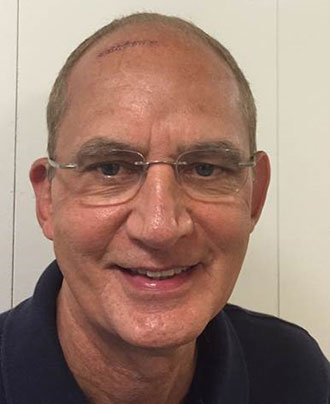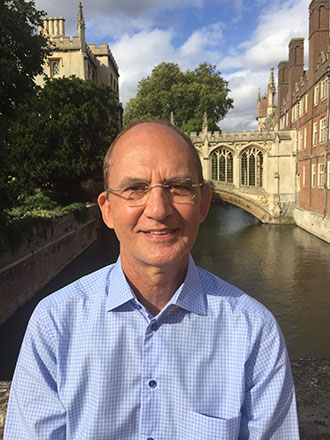
As a researcher and clinician, Dr. Richard (Dick) Colletti, pediatric gastroenterologist at the University of Vermont Children’s Hospital, knows how to analyze information, ask pointed questions, and make careful decisions. So when it came time for him to find the right doctor to remove a rare colloid cyst from his brain, he put those skills to good use.
The problem began in 2010, when an MRI revealed a small, benign, and extremely rare congenital tumor in the center of his brain called a colloid cyst.
The finding was a surprise – Dick was having an MRI for another condition when doctors discovered the cyst. “I had probably had that cyst my entire life,” he says.
Because the cyst wasn’t causing any problems, his doctors recommended watching and waiting. Every year for the next six years, Dick had an MRI to monitor any changes, but the cyst always looked the same.
Things changed in April 2016, when an MRI showed that the cyst had grown significantly. Something would need to be done. “There was concern that if the cyst got large enough, it could cause a serious blockage of fluid in my brain,” says Dick.
Knowing that the cyst might need to be removed, and that surgeons who do a lot of any procedure usually have the best surgical outcomes, Dick asked his neurosurgeon, Dr. Paul Penar, two pointed questions. “First I asked, ‘How many times have you removed a colloid cyst? And he answered 20 times in 20 years,” says Dick. “Then I said, ‘I’d like mine to be removed by the neurosurgeon who has removed more than anyone else in the world. Could you help me find that neurosurgeon?’ And he said, ‘Yes.’”
That’s how Dick discovered Dr. Mark Souweidane at Weill Cornell Medicine and NewYork-Presbyterian Hospital – a neurosurgeon who has removed more than 100 colloid cysts endoscopically over the last two decades. “I later discovered that he had published a research paper about his experience removing the first 87 cysts,” says Dick.
Soon Dick was traveling to New York City with his wife, Rose, to meet Dr. Souweidane. Dr. Souweidane explained how he would go about removing the cyst endoscopically, in a procedure that offered a quick recovery and minimal risk of complications. One risk concerned Dick the most: “There could be injury to an area of the brain that can cause memory loss or memory impairment,” he says. Dr. Souweidane assured Dick that the risk was minimal (less than 2 percent), so the surgery was scheduled for July 28 -- Dick’s 73rd birthday.

The procedure lasted just over three hours, and by 6 pm Dick was in the recovery room. At 7:30 the next evening he was checking out of the hospital and back into his hotel room. “I had some pain and nausea, but it wasn’t severe, so there was no reason for me to stay in the hospital,” he recalls. “Dr. Souweidane said the hospital stay is typically two to three days, but I was discharged after only one. It was pretty amazing.”
Dick’s tumor turned out to be a large one (1.5 centimeters) and somewhat unusual. “Normally colloid cysts are fixed in place,” says Dr. Souweidane, “but this one was mobile, which made it more difficult to remove. It certainly confirms that Dick made the right decision to have the surgery, because a mobile cyst increases the risk of blockage.”
Four days after the surgery, Rose drove Dick back to Burlington. After two weeks resting quietly at home, he was back at work full-time, preparing for an upcoming lecture at Cambridge, England. “I was probably fully recovered after ten days,” says Dick.
Dick continues to feel great. In a letter of thanks to Dr. Souweidane he wrote, “Although I consider it a miracle, I know that the kind of success you have achieved with me and others with a colloid cyst can only result from greatness of vision and leadership, detailed planning, impeccable execution, and continuous learning as you have from systematic data collection and analysis. A master makes it look easy.”
Even as a man of science, Dick still considers himself the beneficiary of a miracle. “As a patient you really are in the hands of those taking care of you,” he says. “So being sure that you’re in good hands is really important.”